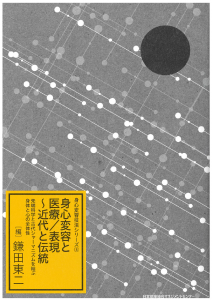An Article by Professor Toshio Kawai, Entitled “Purification of Violence and the Dangers in Psychotherapy: Considering from Jung’s Experience,” Has Been Published in the Themed Book Series, Psychosomatic Transformation and Medical Care / Expression – Modern and Traditions
An article by Professor Toshio Kawai, entitled “Purification of Violence and the Dangers in Psychotherapy: Considering from Jung’s Experience,” has been published in the third volume of the themed book series, Psychosomatic Transformation and Medical Care / Expression – Modern and Traditions. This book series is a compilation of the research on psychosomatic transformation techniques, which was started in 2011 and led by Toji Kamata (Professor Emeritus, Kyoto University).
Psychosomatic transformation techniques are “the knowledge and techniques to shift and transform the state of a body and soul into one’s desired ideal state. Since ancient times, they have been developed in various areas such as religion, art, martial arts, and traditional performing arts in Japan. In this book, the authors focused on Waza (discipline and wisdom) as a form of “psychosomatic transformation techniques” that give us suggestions on how to live our lives today. In addition to traditional performing arts and shamanism, the book also includes discussions by experts from many fields related to mindfulness, medicine, psychotherapy, psychiatry and neuroscience.
From the viewpoint of a clinical psychologist and Jungian analyst, Prof. Kawai points out that during pre-modern times, traditional Japanese healing techniques, such as Noh (a musical and dance drama), were based on the premise that the mind extends to the community and other worlds. In his view, even today one of the issues affecting society as a whole or relating to the dead is the possible limitations in understanding a Kokoro that attributes all psychological problems and conflicts to the individual.
Based on these discussions, Prof. Kawai cites the two psychological crises that Jung experienced during World War I and II. While considering his own clinical experiences in addition to the reactions and recovery process of people’s Kokoro after the Great East Japan Earthquake, Prof. Kawai presents a perspective in which disasters and accidents that transcend individuals are distinguished from personal problems and should be viewed as “spiritual violence.” In the end, he discusses the meaning and difficulty of purifying this spiritual violence in our time.
(Reported by Hisae Konakawa, Research Fellow)

Toshio Kawai
“Purification of Violence and the Dangers in Psychotherapy: Considering from Jung’s Experience,” in Psychosomatic Transformation and Medical Care / Expression – Modern and Traditions
Published by JMA Management Center, pp.278-286. (Japanese version only)
<Contents>
Introduction
1. Spiritual violence and healing in the pre-modern times
2. Personal violence and spiritual violence
3. World War I and The Red Book
4. World War II and near-death experience
*Book Information
Psychosomatic Transformation and Medical Care / Expression – Modern and Traditions (Japanese version only)
Edited by Toji Kamata
Publisher: JMA Management Center (2021)
624 pages, ISBN-13: 978-4-8207-2898-6
2021/04/09